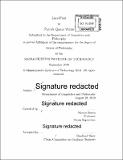Love first
Author(s)
White, Patrick Quinn.
Download1142632630-MIT.pdf (8.441Mb)
Other Contributors
Massachusetts Institute of Technology. Department of Linguistics and Philosophy.
Advisor
Kieran Setya.
Terms of use
Metadata
Show full item recordAbstract
How should we respond to the humanity of others? My dissertation argues that the fundamental answer is love, defending and carrying out the beginnings of a love-first approach to ethics. The ideal of love for all (agape) has religious origins, and in my first chapter, I show that it can be detached from this religious context and still serve as a foundation for ethics. Ordinary love we have for friends and family is subject to "outward pressure": in our love for the few, we find reason to love all. I explain how we can make sense of such love, even love for those we have not met, in terms of the neglected phenomenon of "plural love," as when we love the members of our family, as such. The problem with agape is not that it is impossible but that it conflicts with the good of selective love. In light of this conflict, I argue that we should treat agape as an ideal to be approximated. We can understand respect as the minimum required approximation of love and derive the basic features of deontological ethics-commitment to equality, respect for autonomy, non aggregative concern for well-being, imperfect duties of beneficence-from the ideal of agape. Where the first chapter is an investigation into how we should act towards others in general, the second turns to partiality, beginning with our love for friends and family. Suppose I help my friend Kevin, acting out of love, when I might have spent my time and resources helping strangers. It seems obvious that I am justified in being partial because we are friends. Yet when I act out of love, I am not motivated by the fact that we are friends (which seems like "one thought too many") but by facts like Kevin's need. The normative and motivational desiderata on a theory of partiality thus pull in opposite directions: where the relationship seems to play a justifying role, it need not be a motivating reason. The solution lies in recognizing the neglected diachronic nature of partiality, and of practical rationality. To act of out love is not to be moved by the fact of one's relationship; it is to have a history of so relating to someone. And it is in virtue of that history that non-relational facts (e.g., that Kevin needs help) have greater rational significance. History counts not as a reason on which we act but as a phenomenon that affects the weight of other reasons. I derive this fact from a (defeasible) rational requirement of constancy and show how this requirement can be generalized to other cases of practical reasoning in the face of parity. My third chapter asks when and why we should tell the truth. Philosophers have traditionally answered this question with an exclusive focus on lying and deception, ways of obscuring the truth, while giving little though to indiscretion-sharing or eliciting a truth that should be left unsaid. I argue that these vices and their correlative virtues must be theorized together. A unified account of honesty and discretion must start with the concrete relationships between speaker and interlocutor. Our relationships determine what information is and is not "in bounds." These communicative norms are constitutive of our relationships-that my friend can ask about my private life where my colleague cannot is part of what makes our relationship an intimate friendship. I argue that our reasons to tell the truth are explained by our relationships: we have reason to follow their communicative norms just insofar as we have reason to be in them. We moreover have reasons to share or withhold the truth in order to shape our relationships: we can put certain topics in or out of bounds, molding our relationships into something new.
Description
Thesis: Ph. D. in Linguistics, Massachusetts Institute of Technology, Department of Linguistics and Philosophy, 2019 Cataloged from PDF version of thesis. Includes bibliographical references (pages 151-160).
Date issued
2019Department
Massachusetts Institute of Technology. Department of Linguistics and PhilosophyPublisher
Massachusetts Institute of Technology
Keywords
Linguistics and Philosophy.